“Un, deux, trois!” The countdown ends and we back roll off the Zodiac into the warm, turquois waters. Soon I am descending – three, four, five meters. I begin to make out the bottom at 25-30 meters but something does not seem right. I blink several times and rock my head back and forth a few times but the scene remains unchanged. The sea floor is moving. An undersea earthquake? a gas mixture problem? nitrogen narcosis? – surely not at these shallow depths. I drop past 10 and then 15 meters and it slowly begins to register. As far as my eye can see, the bottom is carpeted with a seething mass of fish. These are not small, sardine-like fish but a much larger species which I recognize as Epinephelus polyphekadion, usually known as Camouflage Groupers.
I fin to my right and still there is no end to the aggregation. 20,000, 30,000, perhaps as many as 50,000 fish, it is impossible to estimate but this is surely one of the largest gatherings of reef fish on our planet. Certainly in 25 years of diving it is a scene unlike anything I have ever encountered.
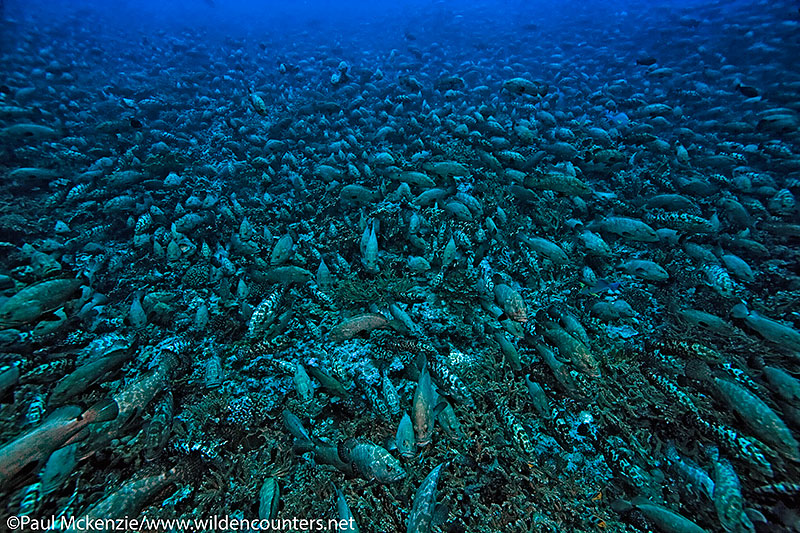
Huge aggregation of Camouflage Groupers, Fakarava, Tahiti
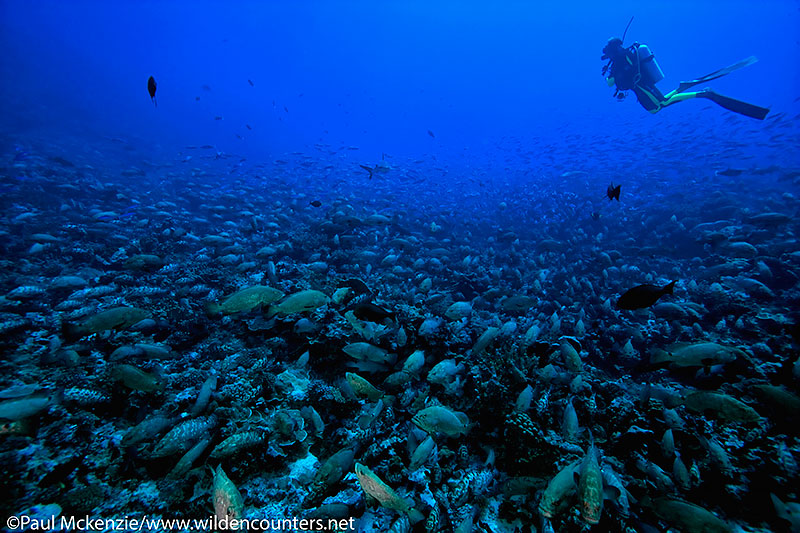
Diver with huge aggregation of Camouflage Groupers, Fakarava, Tahiti
I descend further so that I am now in among the Groupers. They pay me no attention and many brush past seemingly oblivious to my presence.
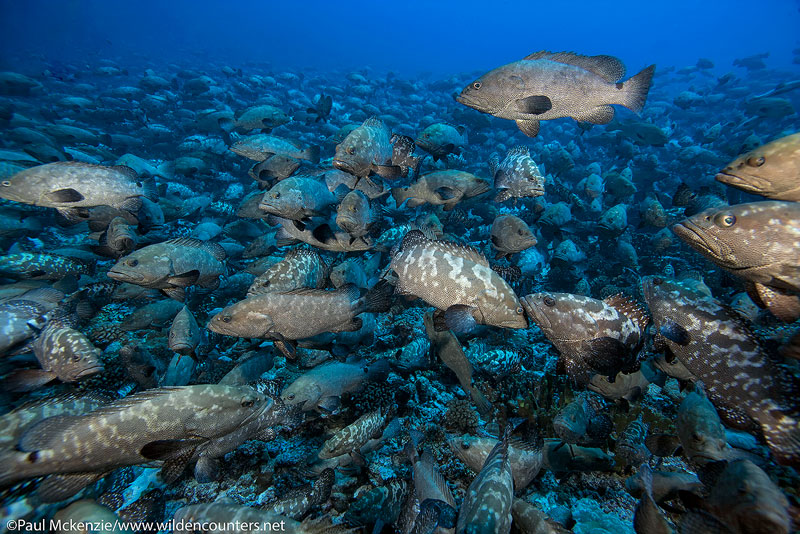
Huge aggregation of Camouflage Groupers, Fakarava, Tahiti
The visibility is strangely excellent in some areas and almost non-existent in others. I drift into what seems like an underwater cloud. Then in front of me, a group of six fish shoot up from the reef floor into mid-water. The fish in the middle, a female, releases a stream of milky spawn, which the attendant males do their best to fertilise. In a flash, two six-foot Grey Reef Sharks power into the spawn, jaws agape. Sharks are everywhere. Usually languid in their movements, they swim with purpose and menace, pectoral fins angled downwards. Grey Reefs are the predominant species but there are also Silvertips and Blacktips with their distinctive elongated dorsal fins and wide girths.
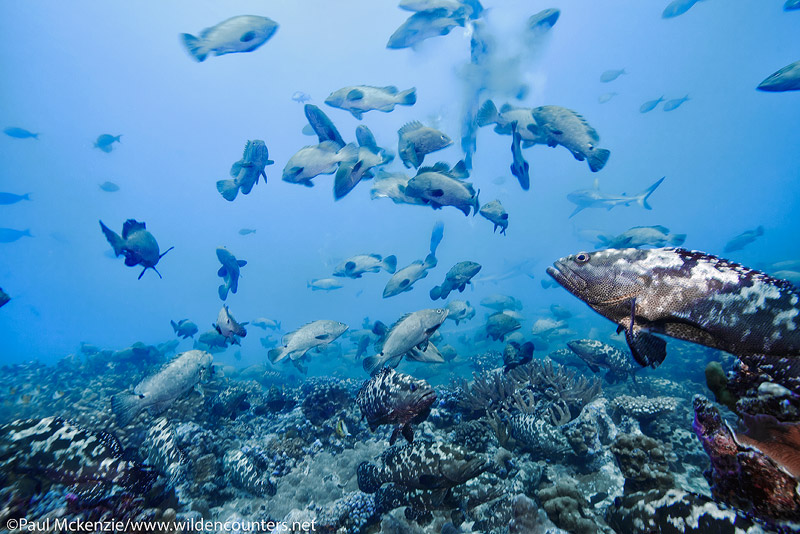
Camouflage Groupers spawning, Fakarava, Tahiti
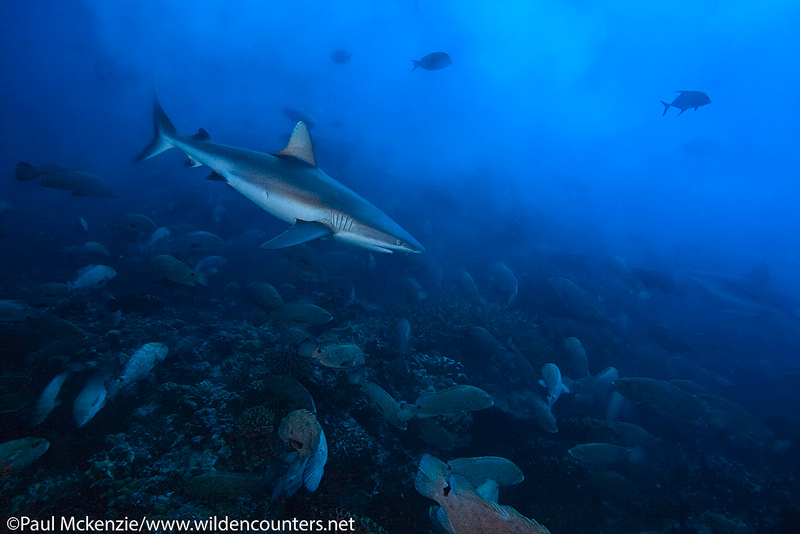
Grey-Reef Shark swimming among Camouflage Groupers in water thick with spawn, Fakarava, Tahiti
The sharks are not just after the spawn but the fish themselves. Over to my right, a Blacktip surges vertically at another spawning group. It happens so quickly that I just have time to see the extended mouth and rows of teeth with bits of Grouper trailing behind.
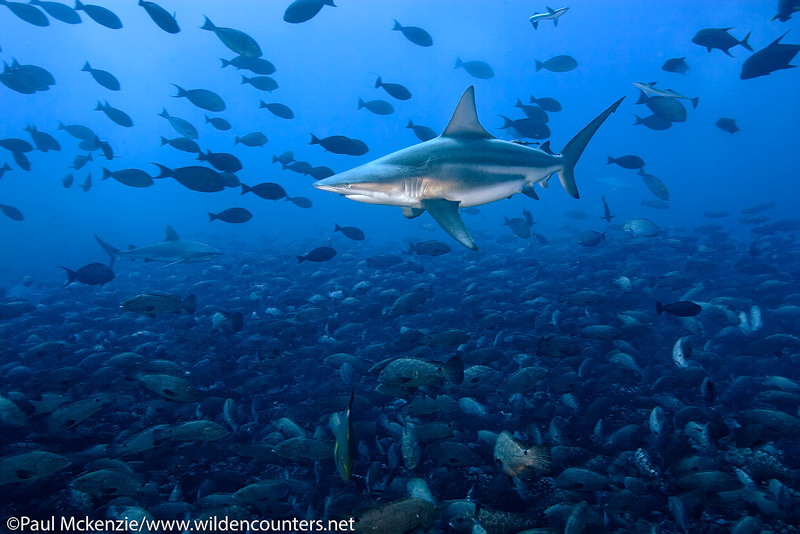
Black-Tip Shark swimming among spawning aggregation of Camouflage Groupers, Fakarava, Tahiti
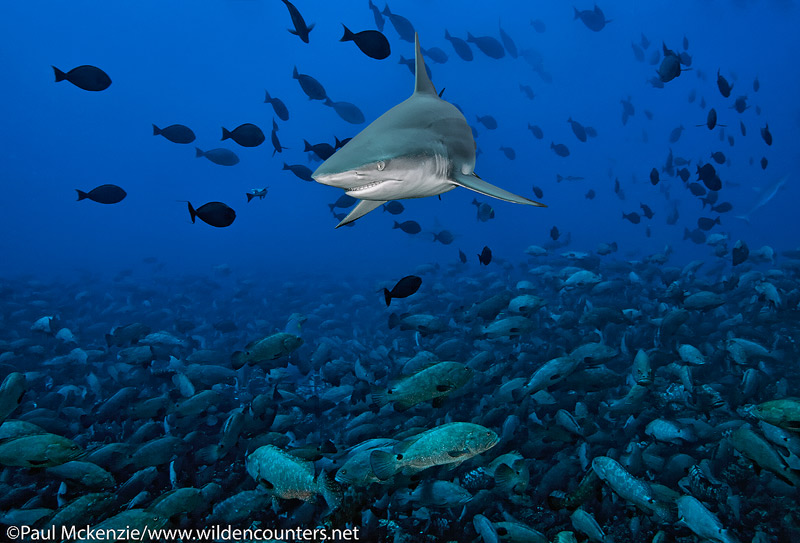
Grey-Reef Shark above huge aggregation of spawning Camouflage Groupers, Fakarava, Tahiti
So enthralled have I been by the action that I have completely forgotten about the camera in its underwater housing that I have been gripping onto tightly. Idiot. I begin shooting blindly. A Grey Reef shark takes two Groupers in one go, almost within touching distance. I press the shutter at exactly the perfect moment with the head of one Grouper protruding from the shark’s mouth. OMG. I glance down at the resultant images on the LCD camera back. Duhhhh! The image is badly underexposed and the shark’s underside is blown from the strobe lighting. How am I making such elementary mistakes?
I have been sucking air to the point of hyperventilating such has been the excitement. I have 50 bar of air left. At 26 meters I am one minute from exceeding my no decompression limits. Not a big deal but I need to start ascending immediately and allow plenty of time on the way up to rid my blood of the excess nitrogen that has built up.
After a two-hour surface interval, I am back in the water. The peak Grouper spawning has subsided but the action remains intense. With the Groupers blanketing the reef floor, a second species, Yellow Fin Surgeonfish, have suddenly appeared in large aggregations. They also begin to spawn. Huge, pulsating schools of Dark Banded Fusiliers join the fray, often enveloping the fish and spawn. I find myself in the middle of one such ball. The water darkens as they block out the sun from above but just as quickly an opening emerges as a Shark, intent on a meal of spawn, sends the fish scattering.
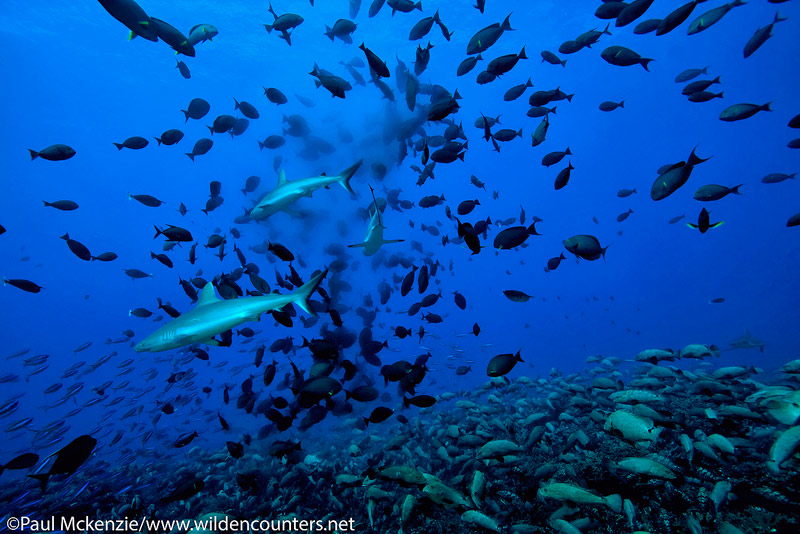
Grey Reef sharks feeding among spawning Yellowfin Surgeonfish with Camouflage Groupers carpeting the reef floor, Fakarava, Tahiti
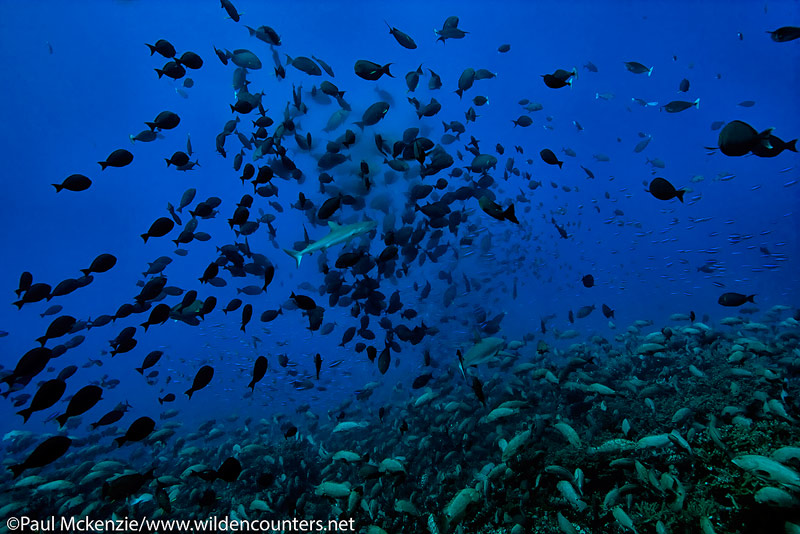
Spawning Yellowfin surgeonfish with attendant Grey Reef Sharks, Camouflage Groupers below, Fakarava, Tahiti
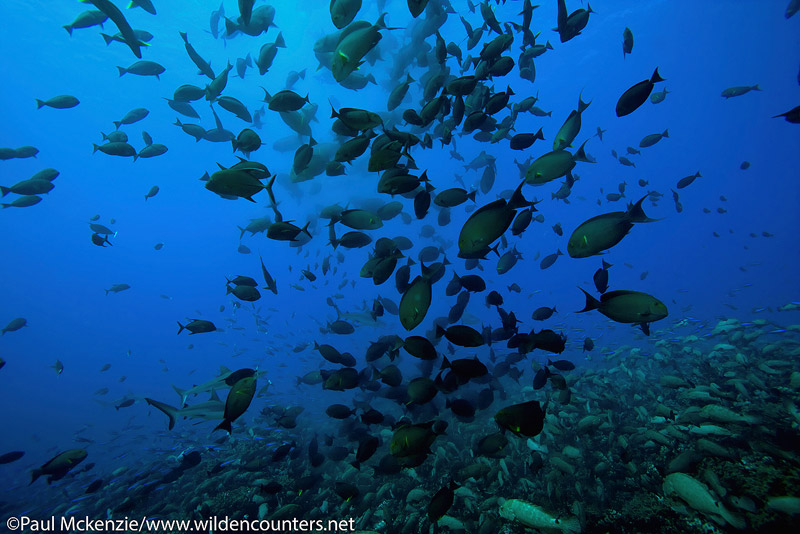
Yellowfin Surgeonfish spawning, Fakarava, Tahiti
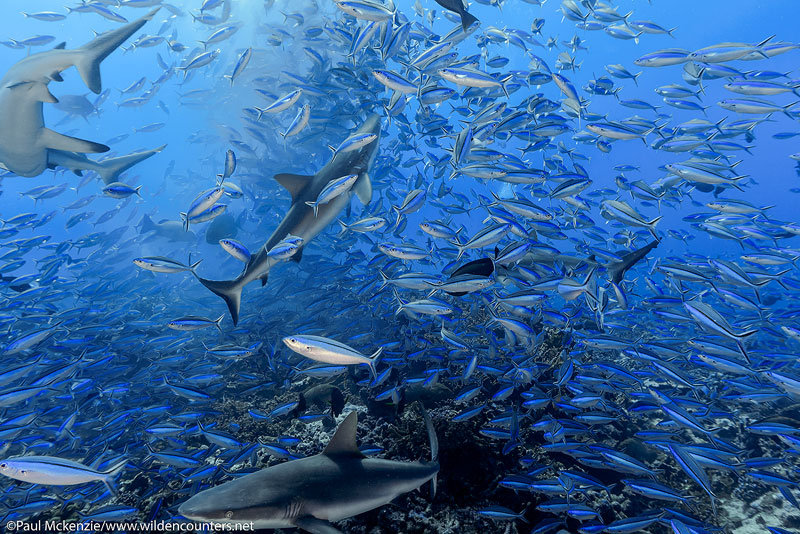
Grey Reef Sharks and Dark Banded Fusiliers feeding on Camouflage Grouper spawn, Fakarava, Tahiti
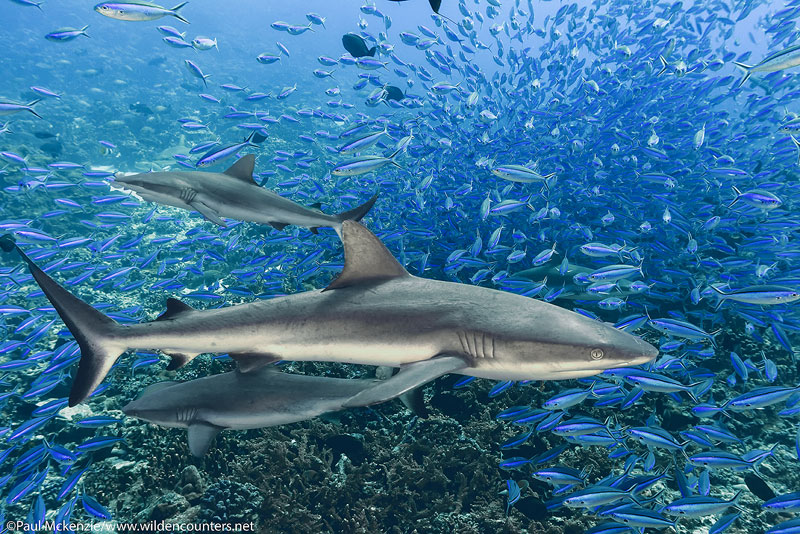
Grey Reef Sharks swimming among a school of Dark Banded Fusiliers, Fakarava, Tahiti
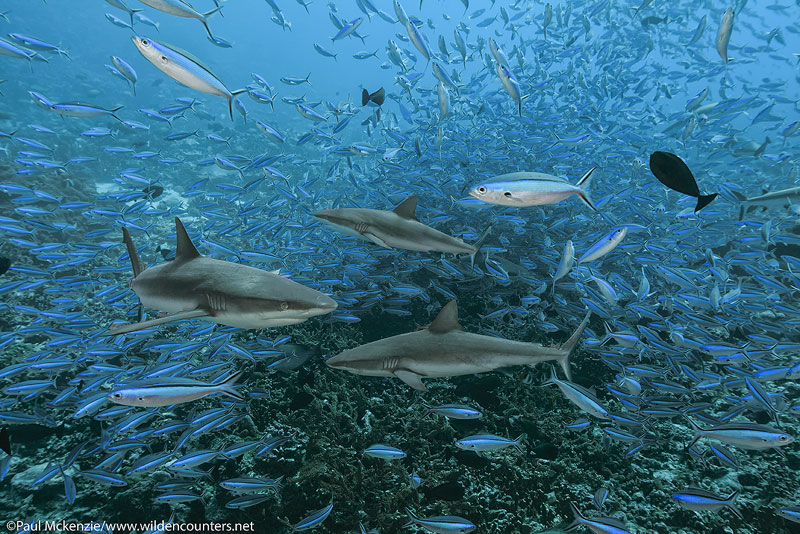
Grey Reef Sharks swimming among Dark Banded Fusiliers, Fakarava, Tahiti
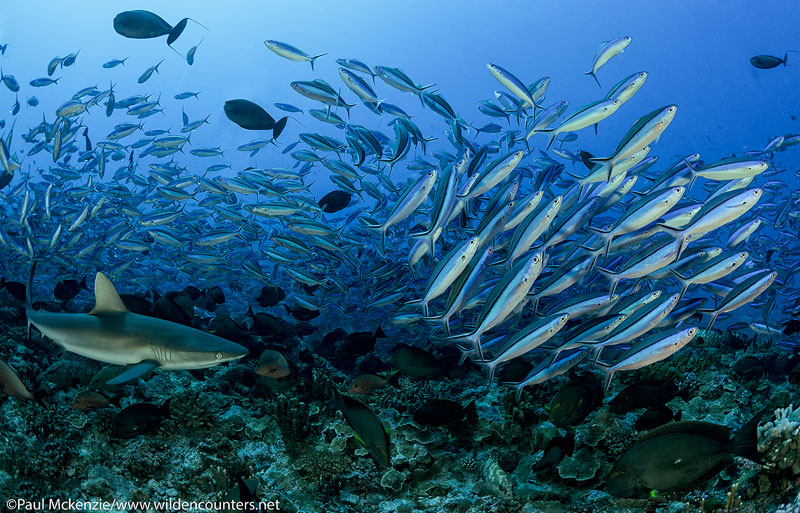
Grey Reef Shark scattering Dark Banded Fusiliers, Fakarava, Tahiti
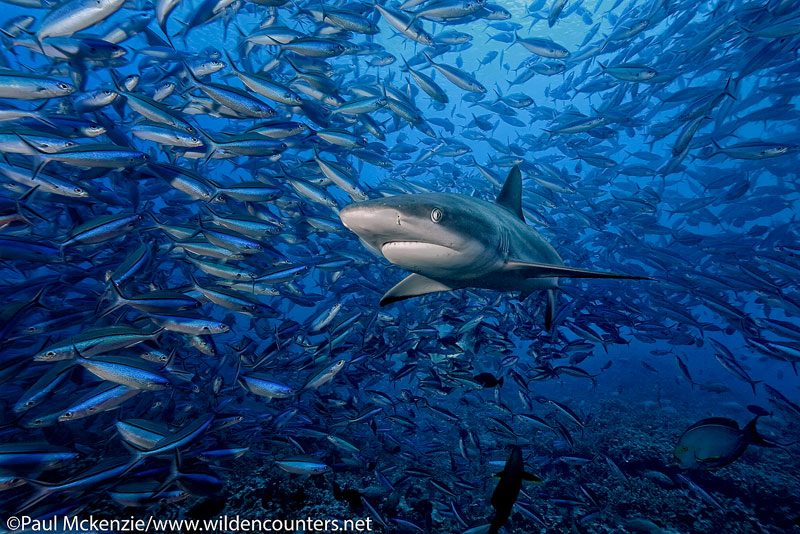
Grey Reef Shark swimming among schooling Dark Banded Fusiliers attracted by Camouflage Grouper spawn, Fakarava, Tahiti
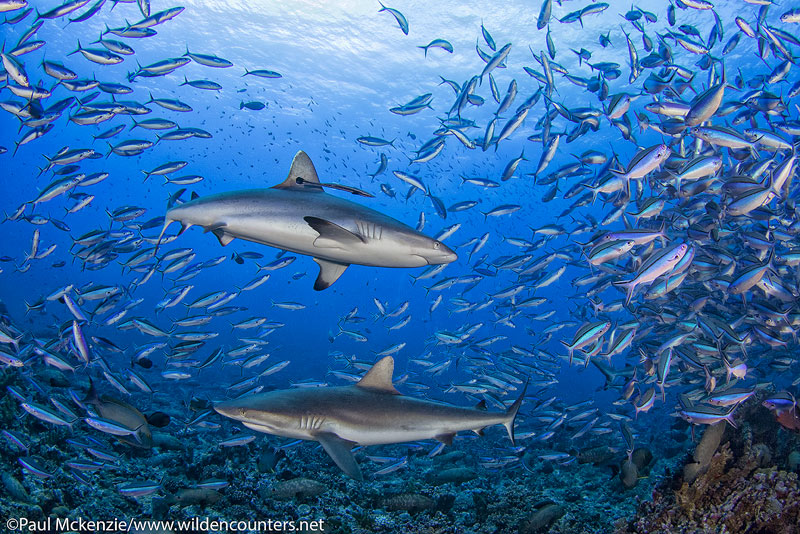
Grey Reef Sharks swimming among Dark Banded Fusiliers, Fakarava, Tahiti
I pause to survey the spell binding scene all around me – Groupers packed together in their thousands spread across the bottom; Surgeonfish in vast numbers spawning in mid-water; multiple, swirling balls of Fusiliers which move in a synchronized fashion, wrapped around the spawn; and most dramatic of all, hundreds of highly charged sharks.
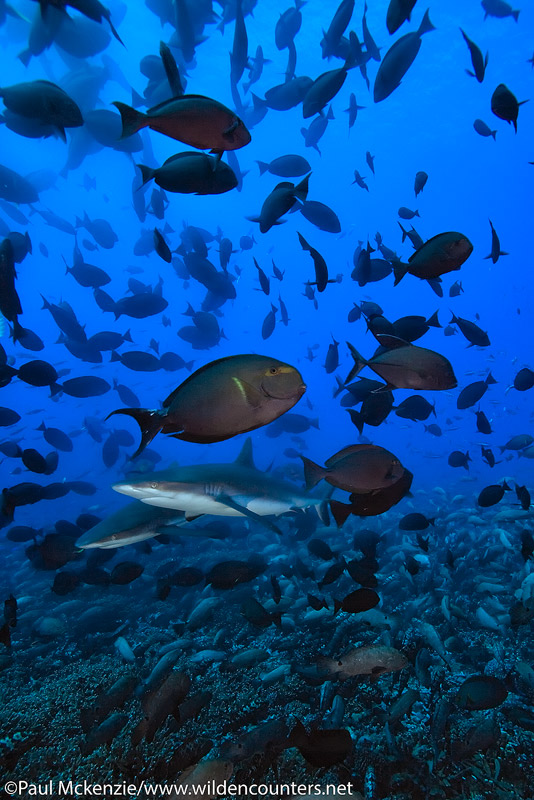
Grey Reef Sharks among spawning Yellowfin Surgeon fish with Camouflage Grouper aggregation on the reef floor, Fakarava, Tahiti
The question doing the rounds in my frazzled brain is how can it be that a natural history event of such staggering proportions has remained under wraps all this time?
When I first stumbled on these incredible scenes in June 2009, it was by pure, dumb luck. Fakarava was best known for its prodigious shark numbers. There are very few places on our planet where you can still see sharks in such prolific quantities and this is what had originally drawn me to this idyllic destination. It is also a Mecca for various large reef fish species including the endangered Napoleon Wrasse.
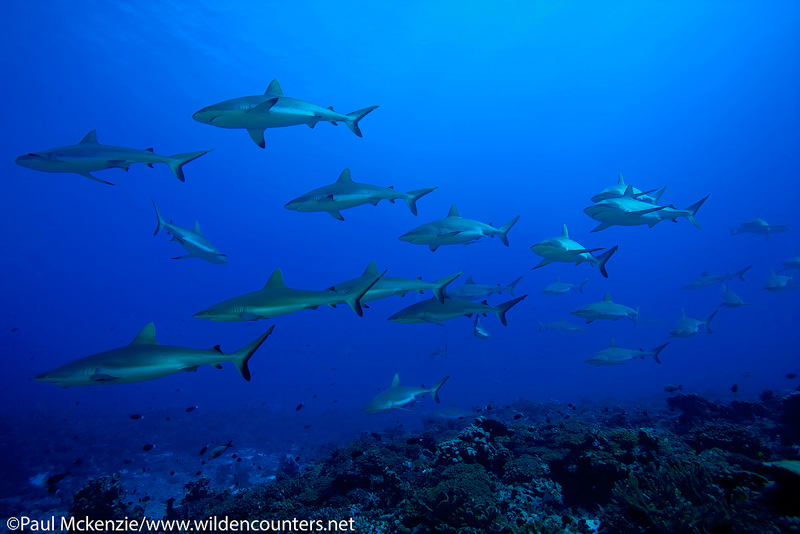
Grey Reef Sharks, Wall of Sharks, South Pass, Fakarava, Tahiti
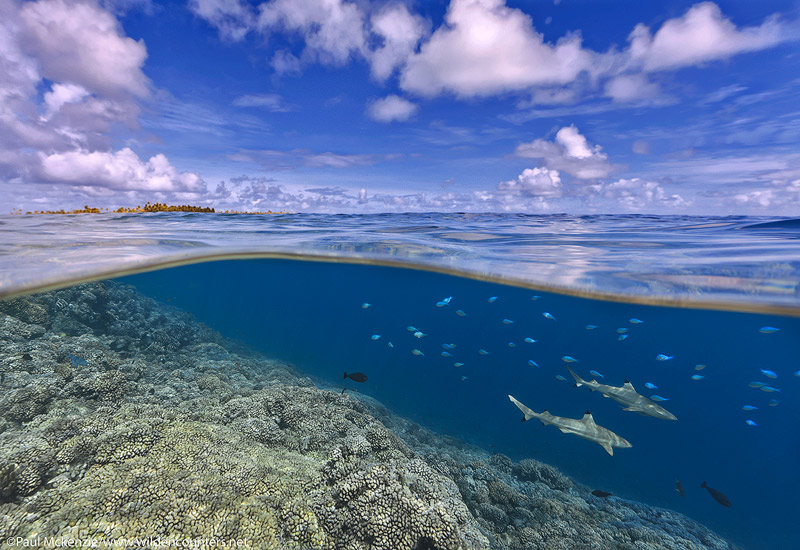
Over-under view of Black Tip Reef Sharks swimming over coral reef, Fakarava, Tahiti
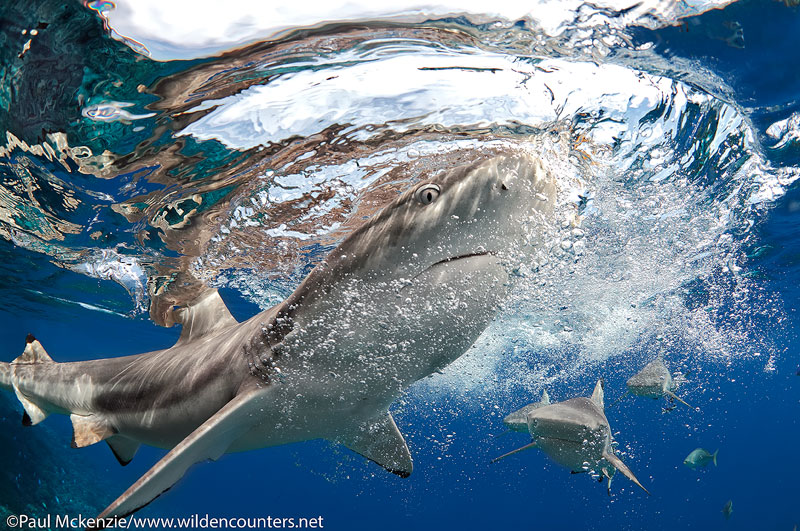
Close-focus, wide-angle view of Grey Reef Sharks, Fakarava, Tahiti
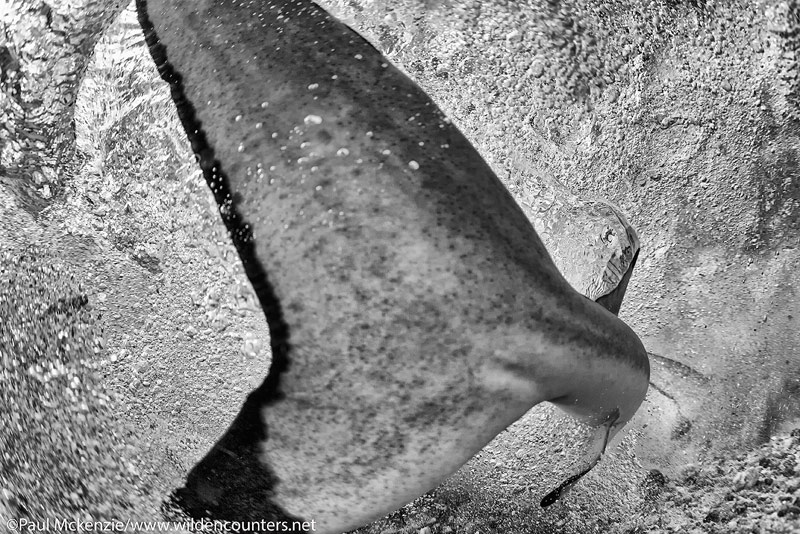
Black Tip Reef Shark tail fin, Fakarava, Tahiti
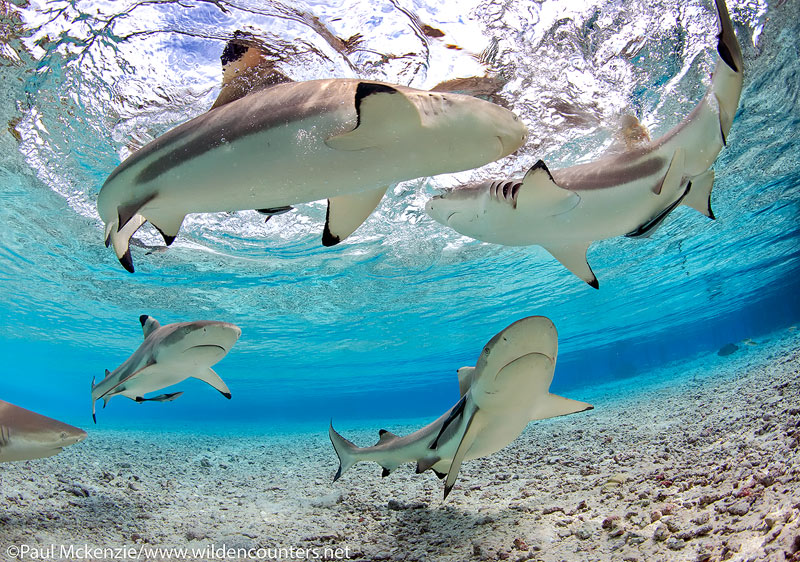
Grey Reef Sharks swimming in shallow water lagoon, Fakarava, Tahiti
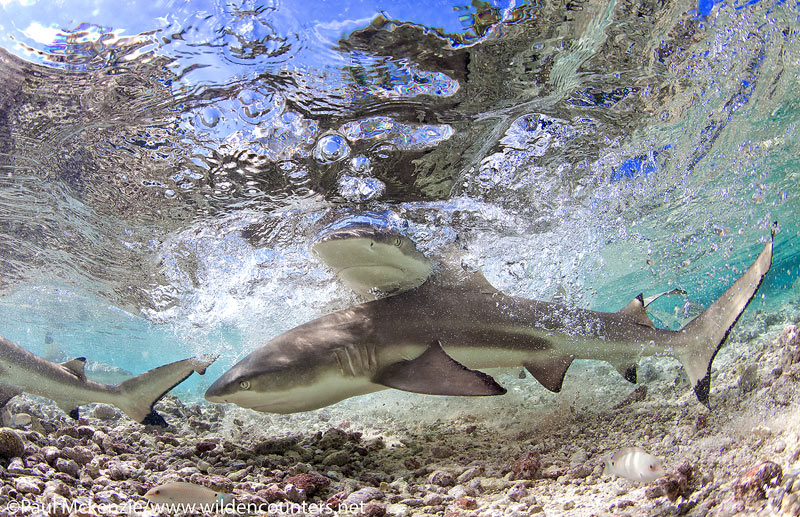
Grey Reef Sharks swimming in shallow water lagoon, Fakarava, Tahiti
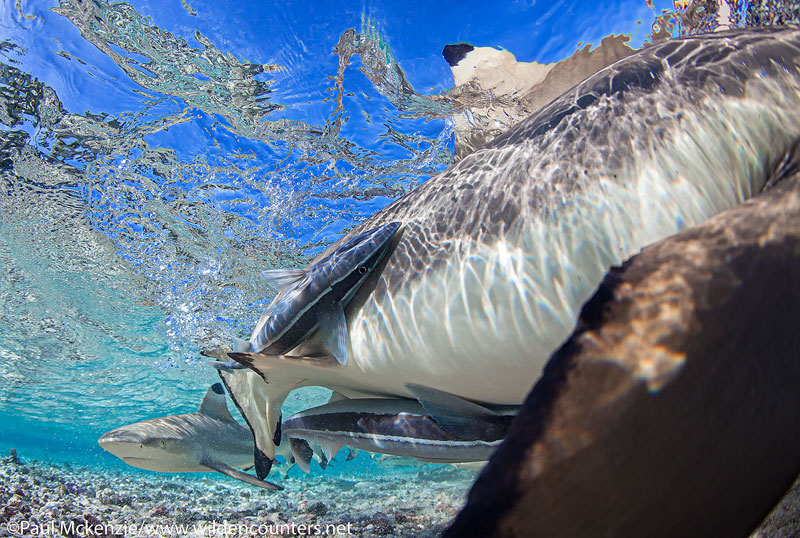
Grey Reef Sharks and Slender Suckerfish in shallow water lagoon, Fakarava, Tahiti
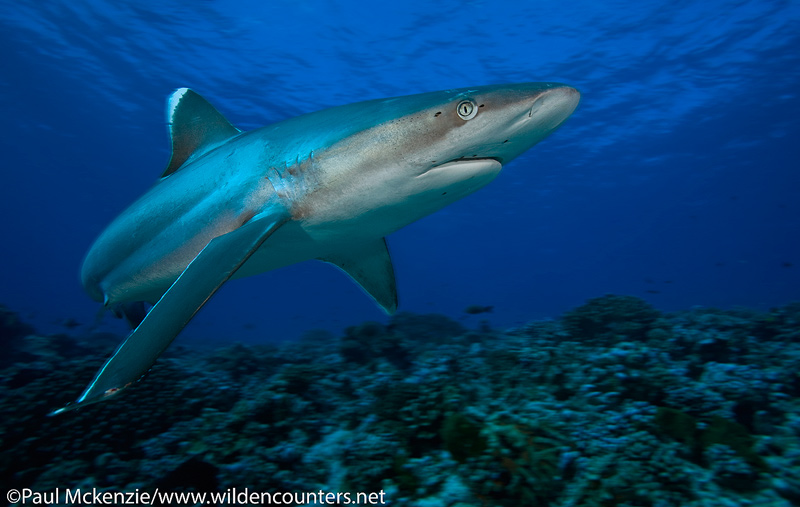
Silvertip Shark, Fakarava, Tahiti
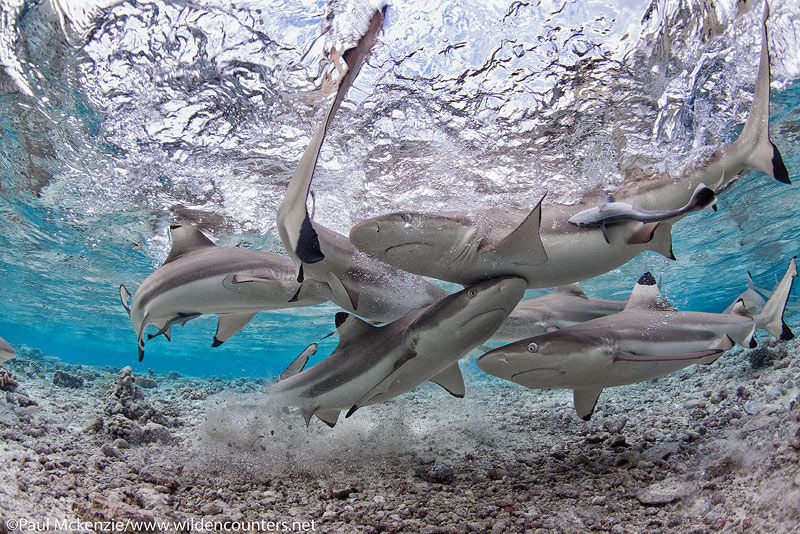
Grey Reef Shark melee, shallow water lagoon, Fakarava, Tahiti
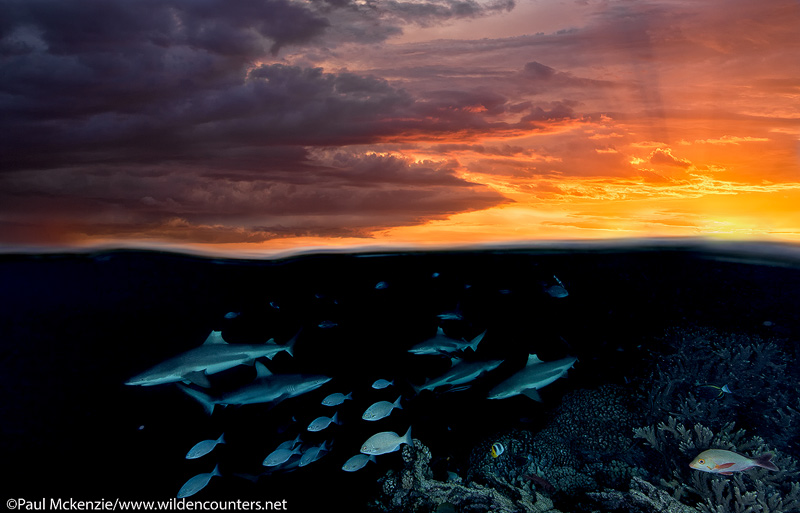
Over-under view of Grey Reef Sharks at sunset, Fakarava, Tahiti
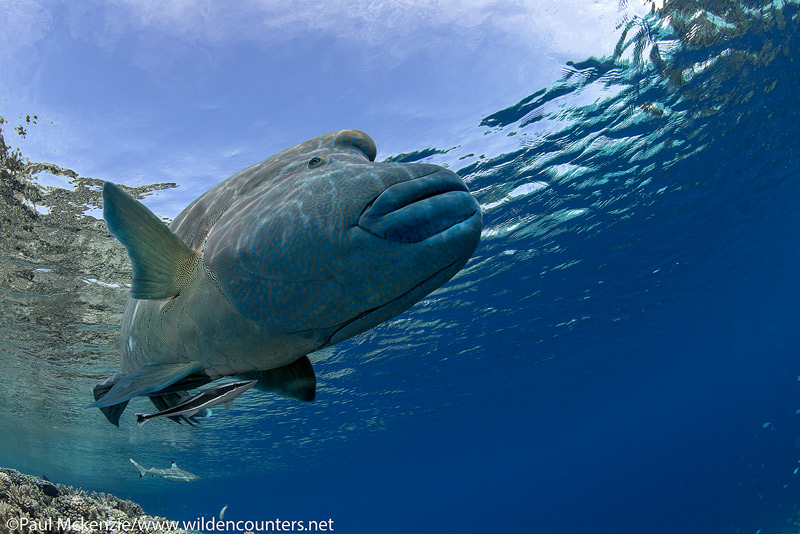
Close-focus, wide-angle, underwater view of Napoleon Wrasse swimming near the surface, Fakarava, Tahiti
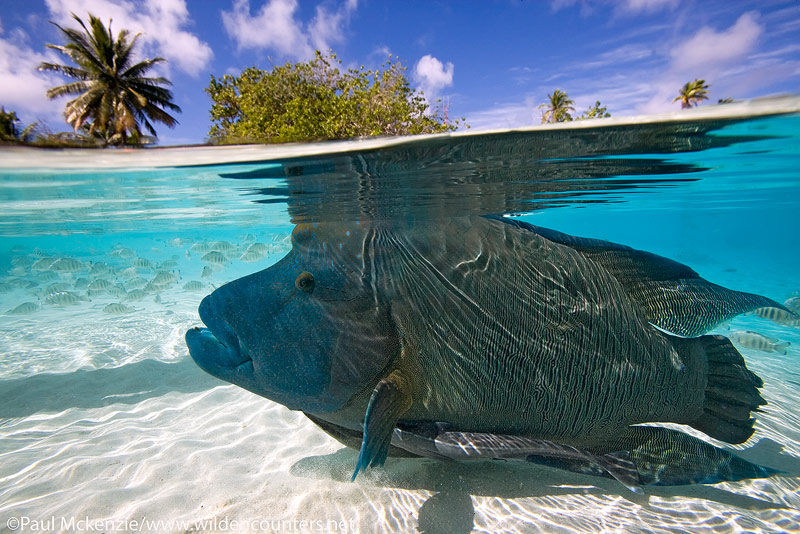
Over-under view of Napoleon Wrasse with Slender Suckerfish swimming in shallow water lagoon, Fakarava, Tahiti
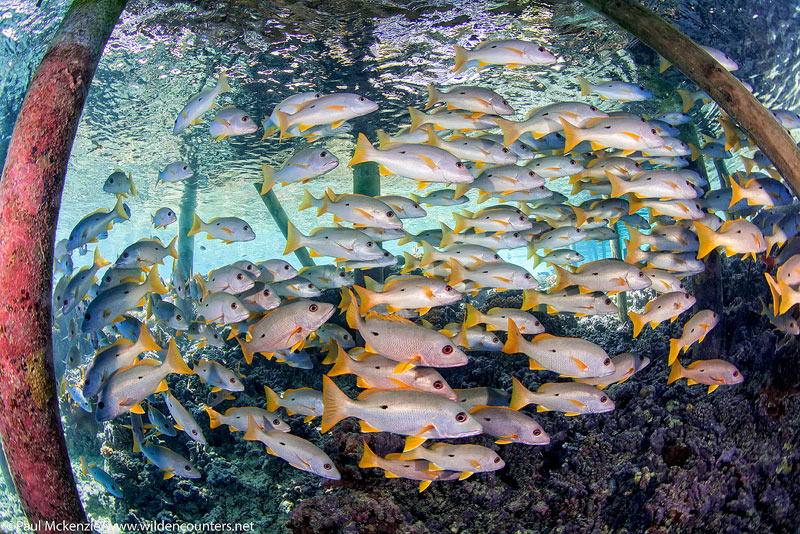
Onespot Snappers swimming below pier, Fakarava, Tahiti
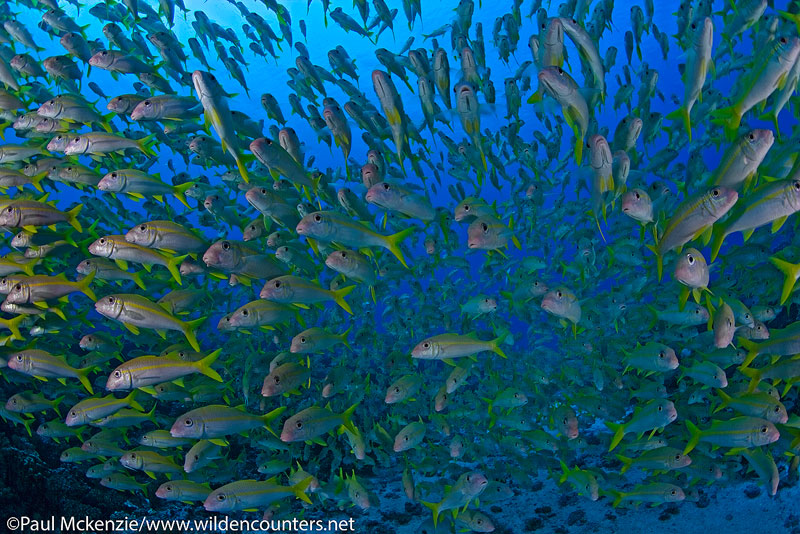
Schooling Yellowfin Goatfish , Fakarava, Tahiti
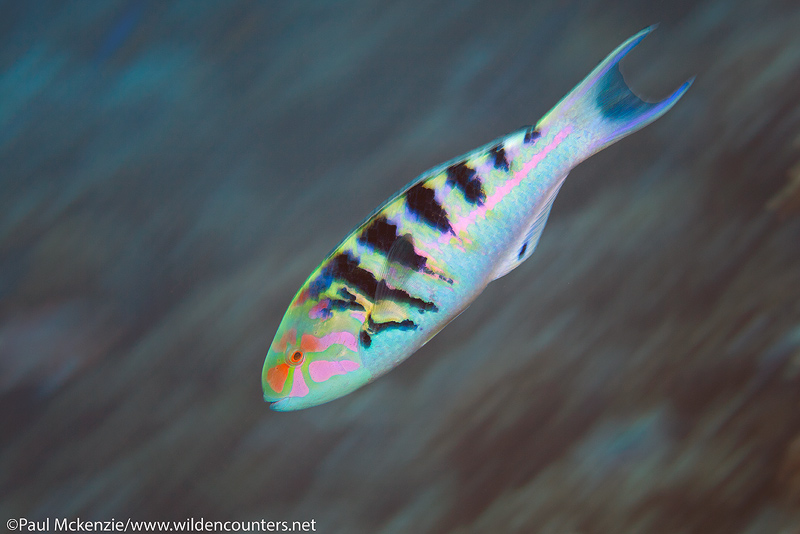
Six Banded Wrasse swimming with motion, Fakarava, Tahiti
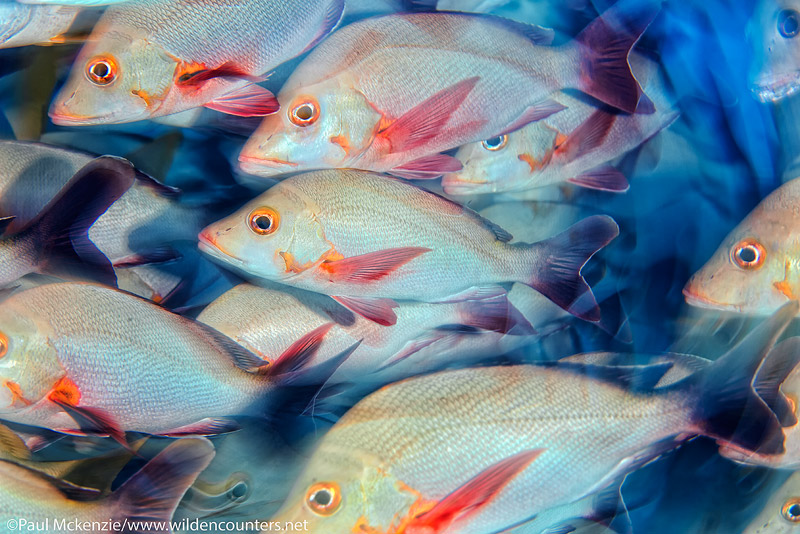
Blacktail Snappers, with motion, Fakarava, Tahiti
Fakarava is giant atoll with a rectangular shape. A thin strip of land, no more than about 200 meters wide at any one spot surrounds a largely deep water, lagoon. The lagoon is fringed by sumptuous white sand beaches and is dotted with postcard-perfect motus or small islands.
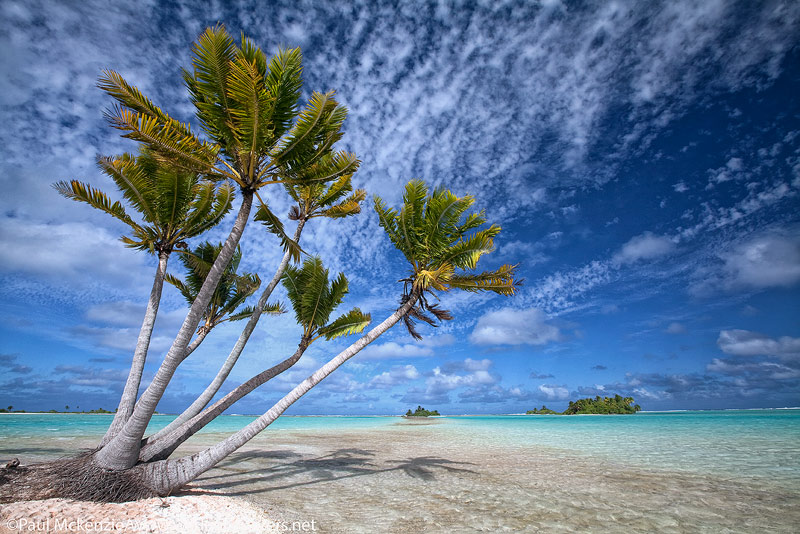
Coconut palms on small motu in lagoon, Fakarava, Tahiti
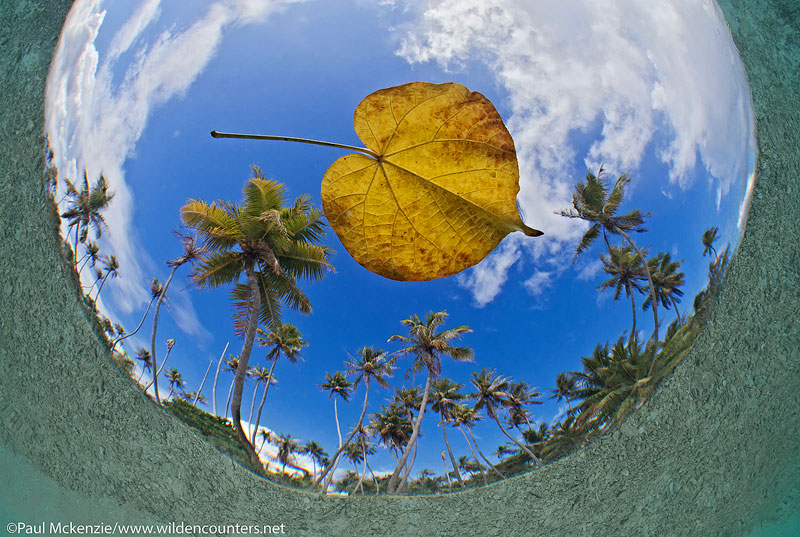
Fish-eye, underwater view of floating leaf with coconut palms in the background, Fakarava, Tahiti
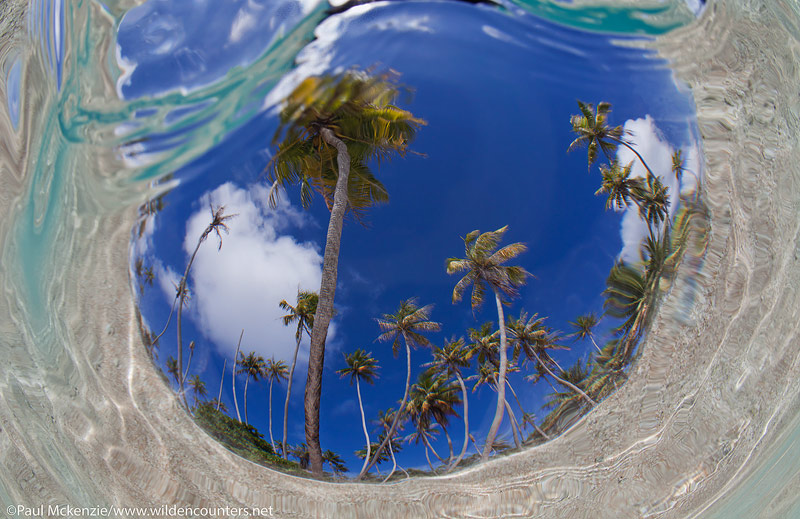
Underwater, fish-eye view of coconut palms, Fakarava, Tahiti
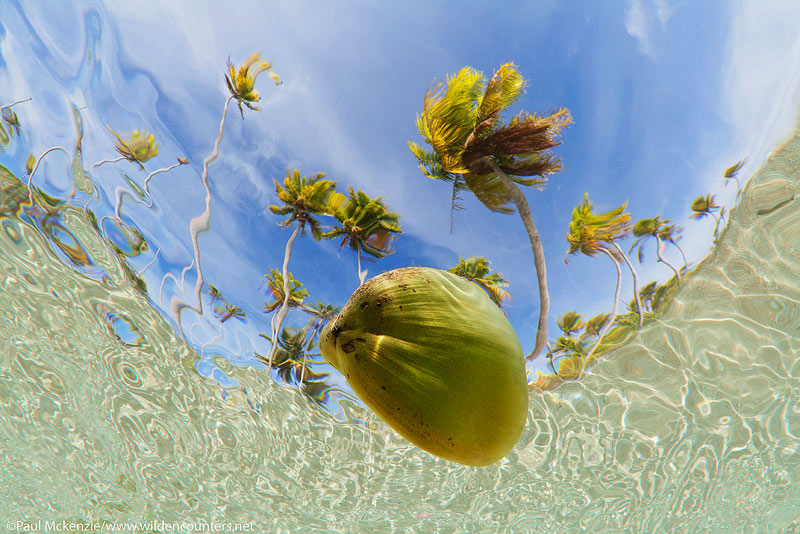
Underwater view of coconut floating in shallow water lagoon with coconut palms in the background, Fakarava, Tahiti
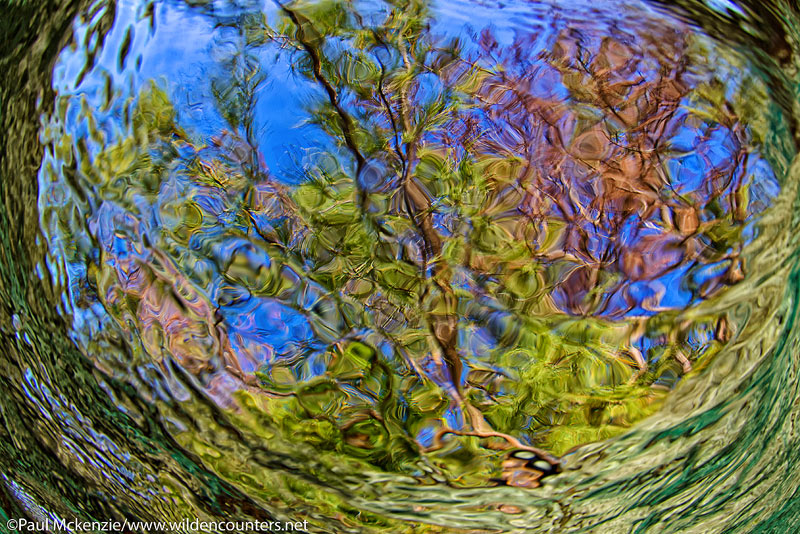
Underwater view of overhanging trees, Fakarava, Tahiti
In contrast to the tranquility of the lagoon, the ocean side of Fakarava, with its fringing barrier reef is altogether wilder.
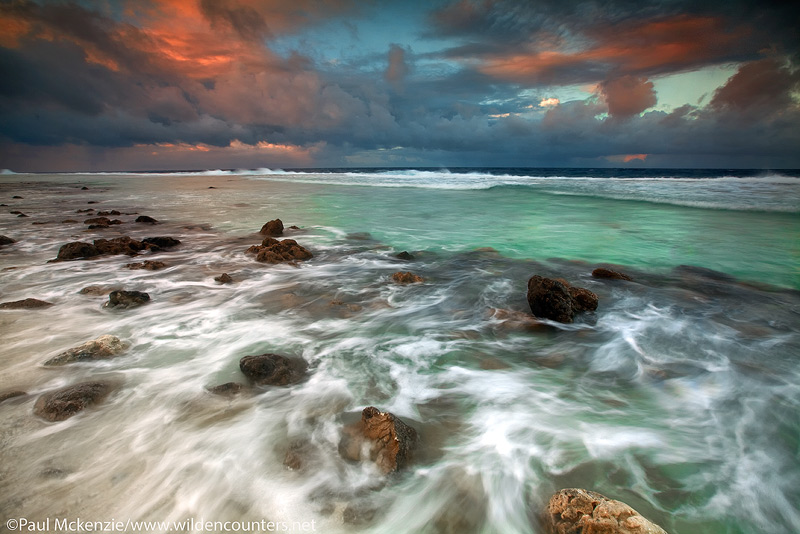
Ocean shore at dusk, reef side, Fakarava, Tahiti
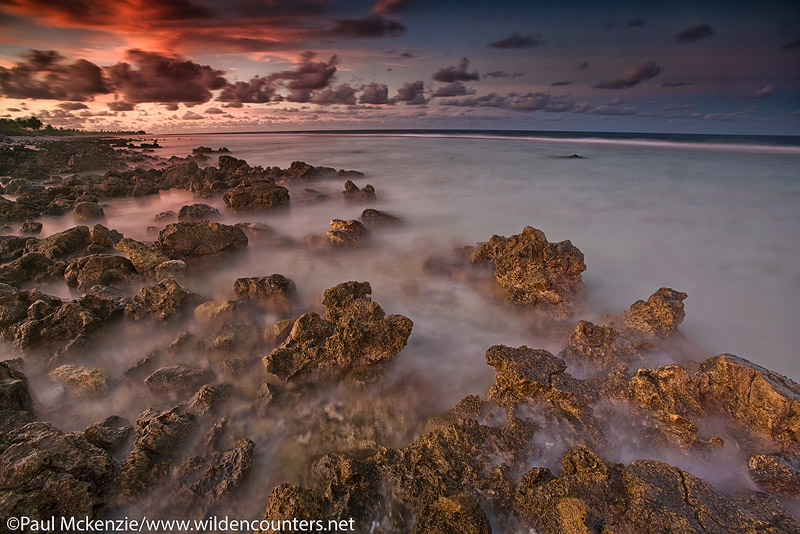
Ocean shoreline at sunset, reef side, Fakarava, Tahiti
The dive operation I was with on those first dives in 2009, the largest in Tahiti, knew almost nothing about the spawning – just vague rumours of large Grouper aggregations but no one had any details of when and where. On the internet, there were no images and no accounts. Over the next few days I spoke to as many locals as possible. Back at home, I contacted marine biologists. Slowly the pieces began to come together.
The aggregation takes place once a year, in June or July depending on the timing of the full moon relative to the winter solstice. The Groupers begin to aggregate one to two weeks before the full moon and the fish numbers build steadily until spawning takes place on the day of the full moon.
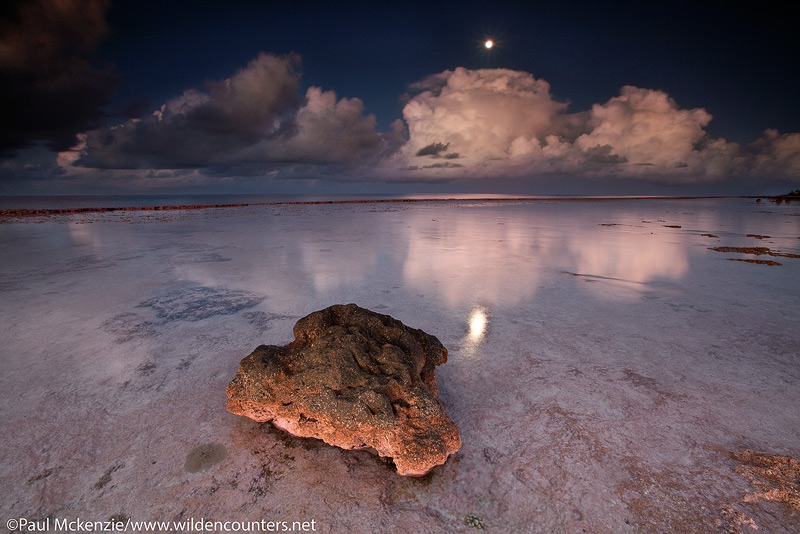
Full moon rising, Fakarava, Tahiti
The spawning occurs in a pass that is about half a kilometer wide, through which millions of gallons of water flow into and out of the adjoining lagoon, twice a day. Generally the fish spawn on an incoming current but I have seen some spawning occur on both a slack and an outgoing current. Small amounts of Grouper spawning continue the morning after the main event but the action on the second day is focused on the spawning Surgeonfish. In the afternoon of either the second or third day after the peak Grouper spawning, the Groupers exit the pass in vast, long lines for the lagoon, a migration that in itself is almost as impressive as the spawning.
Late in the afternoon of the peak Grouper spawning and sometimes for 2-3 subsequent days, another reef fish species, Convict Surgeonfish also spawn in spectacular numbers at a nearby location. The event takes place over a shallow reef and usually on a truly ripping outgoing current. The following images were made in incredibly challenging conditions and were taken with one hand as the other one was required to hold on to the reef to prevent me from being swept away. This has happened but fortunately the current pushed me back to my small resort, where I washed up in near darkness.
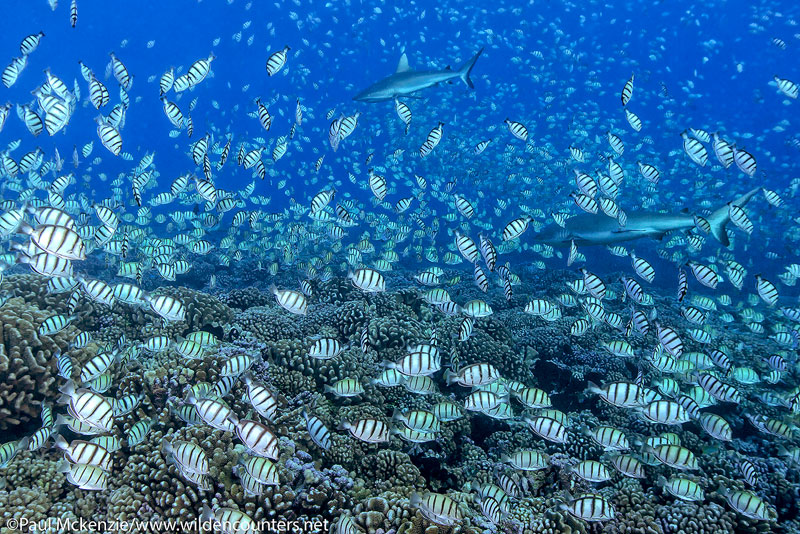
Convict Surgeonfish aggregation with attendant Grey Reef Sharks, Fakarava, Tahiti
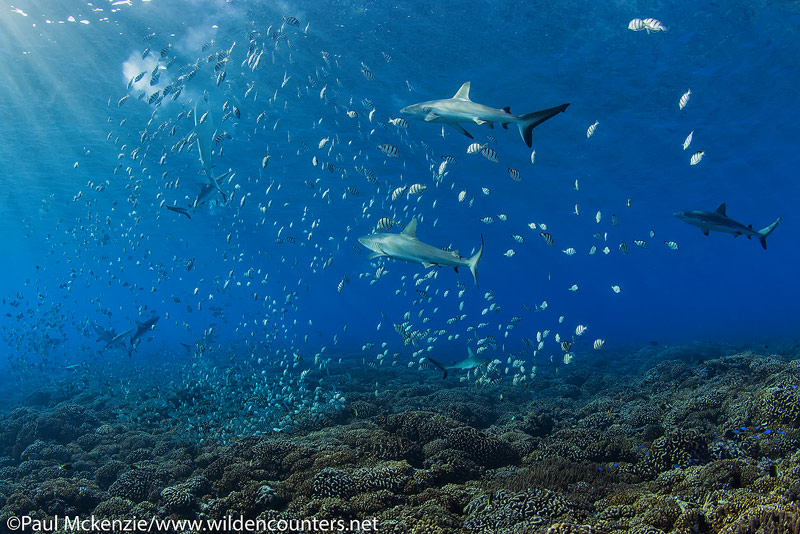
Grey Reef Sharks feeding on spawning Convict Surgeonfish, Fakarava, Tahiti
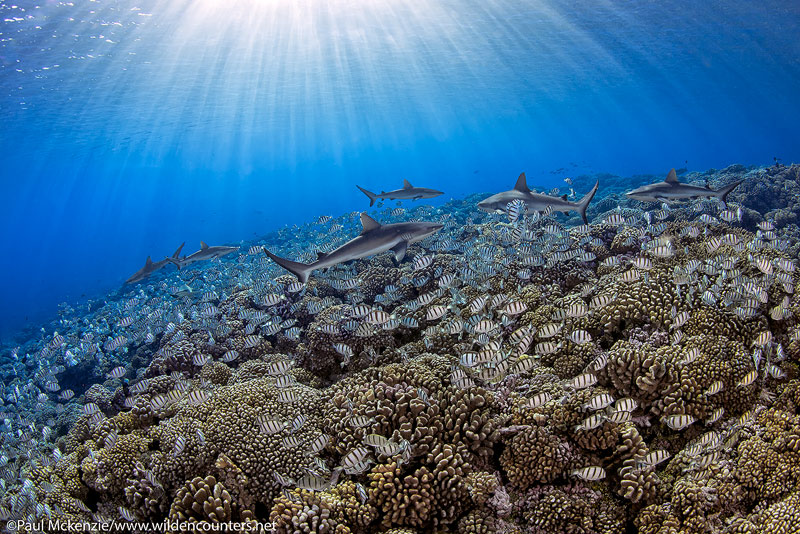
Grey Reef Sharks swimming over an aggregation of Convict Surgeonfish, Fakarava, Tahiti
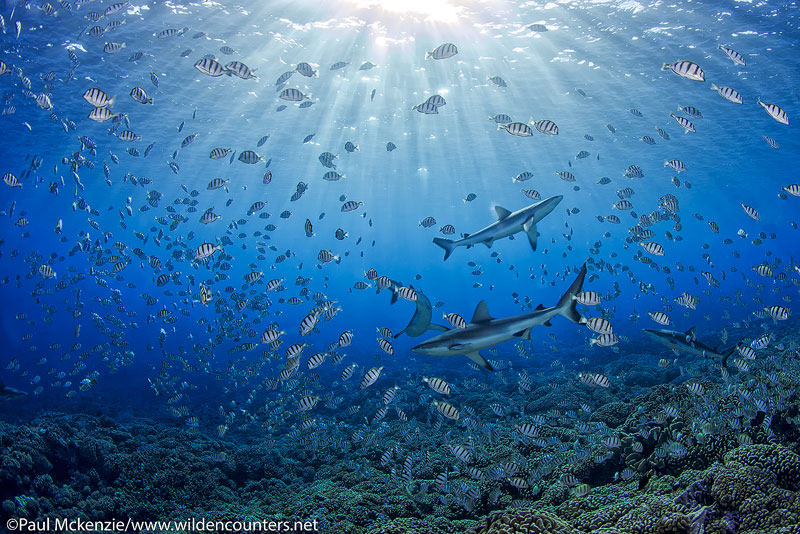
Grey Reef Sharks swimming among spawning Convict Surgeonfish, Fakarava, Tahiti
Since that day back in 2009, I have made the pilgrimage to Fakarava every year. Each time, there have been differences in the sequence of events. For example, there have been noticeable differences from year to year in the intensity of the Surgeonfish spawning. The other big change is that the Grouper numbers are significantly lower than those that I witnessed in the first two years. No one knows why. Could it be the usual culprit of overfishing? This is unlikely as the pass, surrounding area and nearby atolls are extremely well protected. Could it be that some of the fish have journeyed to spawn in neighbouring atolls? A new theory has it that an increase in shark numbers (how often do we hear the word “increase” mentioned in the same sentence with sharks?) has resulted in greater predation on the Groupers or has simply scared them off.
I and a few other divers jealously tried to guard the “sexy secret” but as word has gradually filtered out in the last three years, the number of divers in the water has increased significantly. Last year, a huge, well-funded French film crew was there to document the event. Could it be that excessive diver numbers are playing their part too? Unlike in previous years, the last two years have seen only modest amounts of spawning on the morning of the full moon; and no one has been in the water when it is believed that peak action took place, likely in the late afternoon.
I plan to continue returning each year to Fakarava. I love the place and have become good friends with the owners of the small, picturesque dive resort that sits adjacent to the pass where the Grouper spawn. In recent years I have spent more time concentrating on other marine species and it may be that we will never witness Grouper aggregations and spawning of the scale that I saw in those first two years. Whether marine or terrestrial, this sadly seems to the case with so many of our planet’s wondrous natural history events.
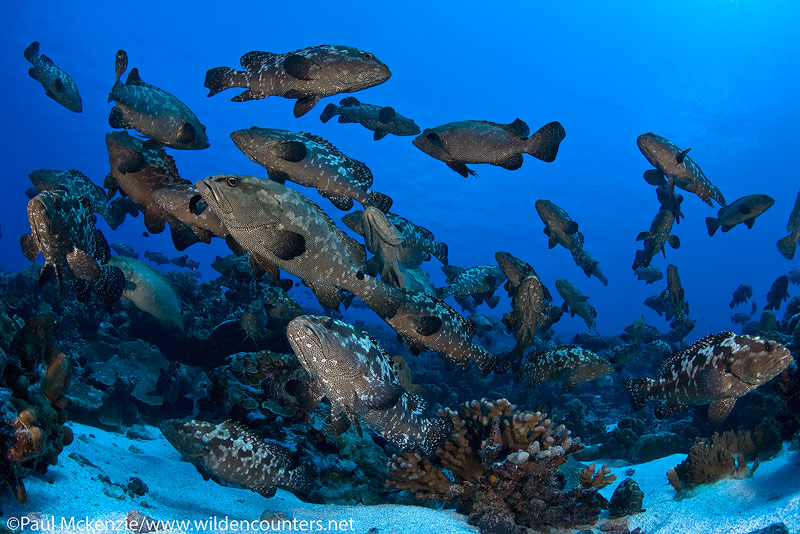
Pre-spawning aggregation of Camouflage Groupers, Fakarava, Tahiti
Clemens Vanderwerf
December 10, 2015
Great write up and images of a very special event. You are quite the expert after so many visits. Hope you figure out what the reason is of the decline.
Timothy Chang
December 10, 2015
Your photos are just AMAZING!!! I must get to Tahiti
Paul Mckenzie
December 11, 2015
Thx Timothy!
margie mcnamara
December 10, 2015
This is just brilliant Paul! I can’t even believe some of the shots. I really love the black and white with the tail. Looks like such an amazing adventure and experience. Thanks for sharing….seeing as I am not a diver I shall never truly know what lies beneath unless I see images like yours.
Paul Mckenzie
December 10, 2015
The tail fin is my favourite too!
Gordon Lindsay
December 10, 2015
WOW Paul just wow, I’ve been a fan of your images for some time now but these are phenomenal, words fail me. You have to return to health just to keep producing images like these, tell him Paveena.
Paul Mckenzie
December 10, 2015
Hi Gordon. I really, really appreciate your support down through the years. Health is all good and headed out on my first (short) photographic trip next week before some longer ones in Jan and Feb.
Malcolm MacKenzie
December 10, 2015
I agree with Gordon,Paul, you have a talent and vision that I am in awe off.
It is great to hear that you are back to good health and planning to continue your adventures.
Paul Mckenzie
December 11, 2015
Hey Malcolm. Great to hear from you. Hope all is well with you. All good my end.
cindy Walpole
December 11, 2015
wonderful as always, thank you Paul
Juli McKinnon
December 11, 2015
Amazing, amazing, amazing! Thank you for sharing these awesome photos.
Paul Mckenzie
December 11, 2015
Thx Juli!
Denise Ippolito/A Creative Adventure
December 11, 2015
Paul, You really have a great knack for photographing under water. Love all of these and it is a fantastic write up!
Paul Mckenzie
December 11, 2015
Thx so much Denise. As always, you are a big inspiration.
Kristy Finstad
December 8, 2016
I am excited to be in Fakarava in June, but won’t arrive until the 14th. Will you (and the Groupers) still be there? Can I share your photos?